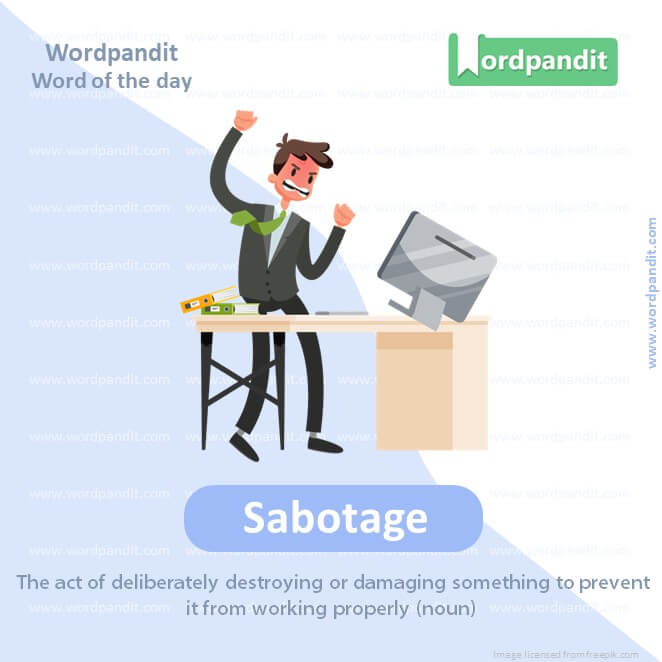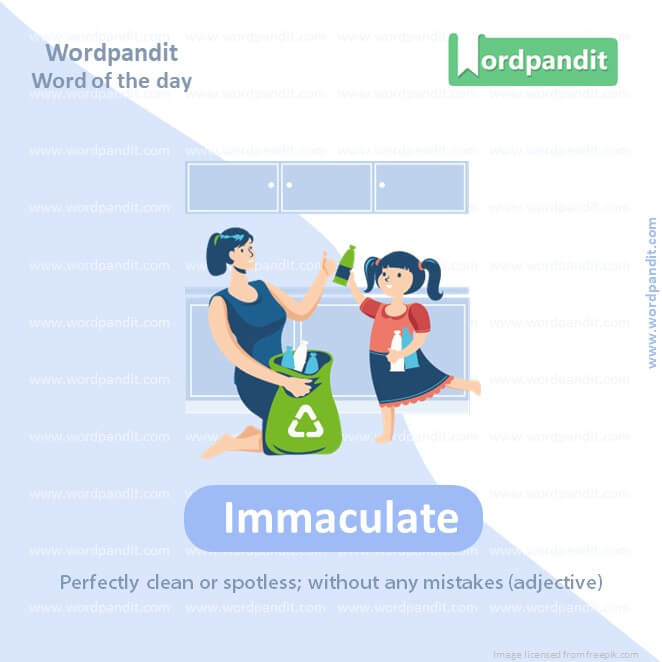Daily Vocabulary Words: List of Daily Used Words
Hi there. Welcome to this special section @ Wordpandit.
Our endeavour here is straightforward: highlighting important daily vocabulary words, you would encounter in The Hindu. This is your repository of commonly used words; essentially, we are posting a list of daily used words. Hence, this has significant practical application as it teaches you words that are commonly used in a leading publication such as The Hindu.
Visit the website daily to learn words from The Hindu.

WORD-1: Virtuosity
CONTEXT: Israel’s military virtuosity masked the reality that its approach was bereft of a political plan.
SOURCE: The Hindu
EXPLANATORY PARAGRAPH: Imagine you can draw the most beautiful pictures with lots of colors and everyone says “Wow!” That’s what it means to have virtuosity; it’s like being super duper good at something, like drawing, singing, or dancing!
MEANING: Exceptional skill or artistry in a field of interest (noun).
PRONUNCIATION: vur-choo-AH-si-tee
SYNONYMS: Mastery, Expertise, Skillfulness, Prowess, Excellence
USAGE EXAMPLES:
1. Her virtuosity on the violin impressed everyone at the concert.
2. The chef’s virtuosity in the kitchen is the reason why this restaurant is so popular.
3. The artist’s virtuosity is evident in the stunning details of his paintings.
4. He practiced for years to achieve virtuosity in martial arts.

WORD-2: Sabotage
CONTEXT: His cynical ploy was to sabotage politics, by strengthening extremists such as Hamas at the expense of more credible and popular Palestinian forces.
SOURCE: The Hindu
EXPLANATORY PARAGRAPH: Sabotage is when someone messes up something on purpose, like when you build a sandcastle and someone comes along and stomps on it so it can’t be the best sandcastle anymore.
MEANING: The act of deliberately destroying or damaging something to prevent it from working properly (noun).
PRONUNCIATION: SAB-uh-tahj
SYNONYMS: Undermine, Wreck, Disrupt, Damage, Subvert
USAGE EXAMPLES:
1. The competitors committed sabotage by breaking the runner’s shoes.
2. She was accused of sabotage against her own team.
3. The movie plot involves a plan of sabotage against the spaceship.
4. They found evidence of sabotage in the malfunctioning machinery.

WORD-3: Immaculate
CONTEXT: Immaculate fielding and absolute consistency while batting and bowling have helped them harvest runs.
SOURCE: The Hindu
EXPLANATORY PARAGRAPH: Immaculate is like when your room is so clean and shiny that not even a tiny speck of dust can be found. It’s perfect and has no dirt at all!
MEANING: Perfectly clean or spotless; without any mistakes (adjective).
PRONUNCIATION: ih-MAK-yuh-lit
SYNONYMS: Spotless, Pristine, Unblemished, Flawless, Unsullied
USAGE EXAMPLES:
1. She wore an immaculate white dress to the party.
2. The car was in immaculate condition, without a single scratch.
3. His immaculate performance earned him the first prize.
4. The hotel room was immaculate and very comfortable.

WORD-4: Relentless
CONTEXT: Shami and Jasprit Bumrah are relentless and there is a clinical display of seam and swing bowling by them.
SOURCE: The Hindu
EXPLANATORY PARAGRAPH: Relentless is like when you keep trying to learn how to tie your shoes, never giving up, even if it’s really hard. You just keep going and going without stopping!
MEANING: Continuing in a determined way without any pause or stopping (adjective).
PRONUNCIATION: rih-LENT-liss
SYNONYMS: Unyielding, Persistent, Unstoppable, Incessant, Tireless
USAGE EXAMPLES:
1. Her relentless pursuit of justice was admirable.
2. The relentless sun made the desert journey difficult.
3. He was relentless in his study schedule, never missing a day.
4. The team’s relentless effort led to their victory.

WORD-5: Veterans
CONTEXT: All the eight veterans receiving the maximum punishment seems to be an ‘unexpected outcome’.
SOURCE: The Hindu
EXPLANATORY PARAGRAPH: Veterans are people who were soldiers in the army and worked hard to protect our country. They are like superheroes who used to wear uniforms and do big, important jobs to keep everyone safe.
MEANING: People who have served in the military; individuals with a lot of experience in a particular field (noun).
PRONUNCIATION: VET-uh-ranz
SYNONYMS: Ex-servicemen, Warhorses, Seasoned, Old-timers, Experienced
USAGE EXAMPLES:
1. On Veterans Day, we honor all veterans for their service.
2. The company often hires veterans because of their discipline and skill.
3. The veterans shared stories of their time in the service.
4. As a veteran teacher, she had a lot of advice for the new staff.
WORD-6: Expatriates
CONTEXT: Expatriates and migrant workers make up almost 88% of the population.
SOURCE: The Hindu
EXPLANATORY PARAGRAPH: Expatriates are people who move to a different country to live or work. It’s like if you and your family went to live in a new place where they speak a different language and have different types of food.
MEANING: People who live outside their native country (noun).
PRONUNCIATION: eks-PAY-tree-ates
SYNONYMS: Emigrants, Migrants, Non-residents, Outlanders, Overseas
USAGE EXAMPLES:
1. The expatriates formed a community in their new city.
2. As an expatriate, he enjoyed learning about new cultures.
3. The company provides extra benefits for its expatriate employees.
4. Expatriates often face challenges in adjusting to a new country.
WORD-7: Indiscretion
CONTEXT: What random acts of indiscretion or oversight led to the framing of such serious charges may never be known.
SOURCE: The Hindu
EXPLANATORY PARAGRAPH: Indiscretion is when you do something you’re not supposed to do, like taking a cookie from the jar without asking. It’s making a choice that you might wish you hadn’t.
MEANING: An act of making a decision that is not wise or careful; a minor misbehavior (noun).
PRONUNCIATION: in-dih-SKREH-shun
SYNONYMS: Imprudence, Misstep, Oversight, Folly, Blunder
USAGE EXAMPLES:
1. His indiscretion at work cost him a promotion.
2. She apologized for her moment of indiscretion.
3. The politician’s indiscretion was reported in the news.
4. The young actor’s indiscretion led to a lot of media attention.
WORD-8: Benevolence
CONTEXT: The Emir has the power to pardon or offer clemency and is known to have exercised this benevolence.
SOURCE: The Hindu
EXPLANATORY PARAGRAPH: Benevolence is when you’re really kind and you want to help others. It’s like sharing your toys with friends or giving someone a hug when they’re sad.
MEANING: The quality of being kind and willing to help others (noun).
PRONUNCIATION: buh-NEV-uh-lence
SYNONYMS: Kindness, Generosity, Charity, Goodwill, Compassion
USAGE EXAMPLES:
1. Her benevolence was known throughout the town.
2. The king’s benevolence ensured that no one in the kingdom went hungry.
3. They set up a fund out of benevolence for the disaster victims.
4. His benevolence towards stray animals made him start a shelter.
WORD-9: Inopportune
CONTEXT: The terrible turn of events could not have come at a more inopportune juncture for the veterans and their families.
SOURCE: The Hindu
EXPLANATORY PARAGRAPH: Inopportune means happening at a time that is not convenient or is a little troublesome, like if it starts raining just when you’re about to go outside and play.
MEANING: Occurring at an inconvenient or inappropriate time (adjective).
PRONUNCIATION: in-OP-er-toon
SYNONYMS: Untimely, Inconvenient, Unfavorable, Ill-timed, Unseasonable
USAGE EXAMPLES:
1. The power outage came at an inopportune moment during the movie.
2. He always seems to call at an inopportune time.
3. The inopportune rain spoiled their picnic plans.
4. She received an inopportune visit when she was about to leave.
WORD-10: Inimical
CONTEXT: It will be far worse if the sentence is executed or the space left behind by Dahra Global is occupied by radical elements inimical to both countries.
SOURCE: The Hindu
EXPLANATORY PARAGRAPH: Inimical is when something is not friendly and could cause harm or trouble, like a character in a story who tries to spoil the hero’s plans.
MEANING: Being harmful or unfriendly; adverse (adjective).
PRONUNCIATION: ih-NIM-ih-kul
SYNONYMS: Hostile, Adverse, Unfavorable, Detrimental, Antagonistic
USAGE EXAMPLES:
1. Smoking is inimical to health.
2. His inimical behavior made him unpopular at school.
3. The inimical environment made survival difficult for the plants.
4. They faced many inimical challenges on their expedition.
vocabulary journal
Are you seeking ways to elevate your language skills? Consider diving into a vocabulary journal. This method has proven instrumental in learning and grasping new words. The benefits of maintaining a vocabulary journal are far-reaching, aiding students, writers, and language enthusiasts alike.
A vocabulary journal is a personal tool that pushes you to explore the depths of language beyond surface understanding. It doesn’t demand any complex skills; all you need is consistency, interest, and a willingness to learn. This simple, yet efficient, method aids you in enriching your language abilities by creating a personalized resource of words that you encounter and learn every day.
How exactly do you learn from a vocabulary journal? It starts from the moment you encounter a new word. Don’t just gloss over it. Instead, jot it down in your journal. With this, your vocabulary journal becomes a growing garden of words, where every new addition sprouts the opportunity for more profound knowledge. Following this method encourages self-education, as it fosters independent research into the meaning, synonyms, antonyms, and uses of the new word.
Moreover, a vocabulary journal is not meant for one-time usage. Regularly revisit your notes and try to use the words in your daily conversations or writings. Over time, these fresh words will naturally weave themselves into your lexicon, refining your language skills.
Being able to articulate your thoughts precisely is an empowering skill. A vocabulary journal is a pathway towards achieving this feat. No matter your current language capabilities, initiating and maintaining a vocabulary journal continues to be a worthwhile endeavor.
Enhancing your language skills with a vocabulary journal is synonymous with building a bridge between learning and understanding. Journey through the vast landscapes of language with a vocabulary journal in tow and discover the joy of never running out of words.










